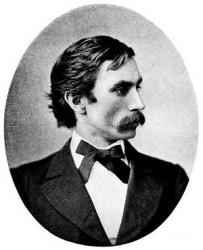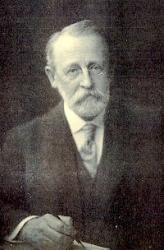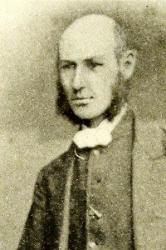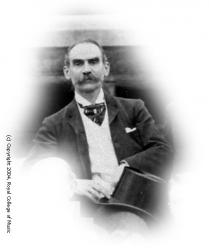Planning worship?
Check out our sister site, ZeteoSearch.org,
for 20+ additional resources related to your search.
- |
User Links
Person Results
‹ Return to hymnal




Export as CSV
W. G. Tarrant
1853 - 1928 Person Name: William George Tarrant Hymnal Number: 150 Author of "The Fathers Built This City" in The Book of Worship of the Church School Tarrant, William George, B.A., b. 1853. Since 1883 Minister of the Wandsworth Unitarian Christian Church. Editor of The Inquirer, 1888-97. One of the editors of the Essex Hall Hymnal. 1890, and of the Revised ed., 1902.
1. Come, let us Join with faithful souls. The Faithful.
2. Draw nigh to God; He will draw nigh to you. The Divine Helper.
3. Long ago the lilies faded. The Constant Presence.
4. The Light along the ages. Easter.
5. With happy voices ringing. Children's Praise.
--John Julian, Dictionary of Hymnology, New Supplement (1907)
W. G. Tarrant
Arthur Cottman
1842 - 1879 Hymnal Number: 142 Composer of "MIRFIELD" in The Book of Worship of the Church School Born: Circa November 1841, Ringwood, Hampshire, England.
Died: Circa May 1879, Brentford, Middlesex, England.
Cottman was a solicitor and amateur musician. His works include:
Ten Original Tunes, 1874
Music:
CATERHAM
COTTMAN
DALEHURST
EVERSLEY
MIRFIELD
MORN OF GLADNESS
--www.hymntime.com/tch
Arthur Cottman
Berthold Tours
1838 - 1897 Hymnal Number: 88 Composer of "DEVENTER" in The Book of Worship of the Church School
Berthold Tours
Thomas W. Freckelton
1827 - 1903 Person Name: Thomas W. Freckleton Hymnal Number: 142 Author of "O God, Who Workest Hitherto" in The Book of Worship of the Church School Freckelton, Thomas Wesley, b. 1827. Minister of Unity Church, Islington. His hymn, "The toil of brain, or heart, or hand" (Christian Service), is in J. P. Hopp’s Collection, 1877 and in Horder's Congregational Hymnal, 1884.
--John Julian, Dictionary of Hymnology (1907)
Thomas W. Freckelton
Richard Watson Gilder

1844 - 1909 Hymnal Number: 137 Author of "God of the Strong, God of the Weak" in The Book of Worship of the Church School Gilder, Richard Watson, LL.D., was born at Bordentown, N.J., Feb. 8, 1844, and educated at a Seminary at Flushing, L.I. He was associate-editor of Scribner's Monthly (now The Century) from its commencement in 1870 to 1881, when, on the death of J. G. Holland, he became editor-in-chief. His poetical works are somewhat numerous, and include The New Day, 1875; Lyrics, 1885; Two Worlds, 1801; Poems and Inscriptions, 1901; and In the Heights, 1905. His hymns in common use are:—
1. In myriad forms, by myriad names. [ Divine Incomprehensibility.] This, in In Excelsis, N.Y., 1897, is composed of the last two stanzas of a hymn sung at the presentation of the Egyptian Obelisk to the City of New York, Feb. 22, 1881. The hymn is in his Lyrics,
1885, p. 5.
2. To Thee, Eternal Soul, be praise! [God speaking through His Saints.] Written for the Methodist Hymnal, N.Y., 190 [Rev. L. F. Benson, D.D.]
--John Julian, Dictionary of Hymnology, New Supplement (1907)
=======================
Gilder, Richard Watson, L.L.D. (February 8, 1844--November 18, 1909). Dr. Guilder's schooling began at his father's school for girls at Belle Vue, Bordentown, New Jersey, where he was the only boy enrolled. Details of his further education are vague, but the future editor began his journalistic work at the age of twelve or thirteen by publishing a paper of his own. He read law for a time before becoming a reporter on Newark, New Jersey, papers. In 1863, he joined a volunteer company of the Union Army, the First Philadelphia Artillery, but saw little actual combat service. Later he acted as paymaster for a railway company. He was a pioneer in magazine illustration beginning with his early association with Scribner's. Always a leader in plans for civic betterment, he was quite active through his late years; though in failing health he delivered a public lecture only two weeks before his death, which occurred at the home of a friend in New York City.
His real contribution to American literature was as editor of an excellent literary magazine rather than through his own writing. He was the recipient of many honorary degrees from various educational institutions.
Sources: Dictionary of American Biography; Appleton's Cyclopedia of American Biography; National Cyclopedia of American Biography; Who Was Who I.
--Robert G. McCutchan, DNAH Archives
Richard Watson Gilder
William W. Gilchrist

1846 - 1916 Hymnal Number: 118 Composer of "LIGHT OF THE WORLD" in The Book of Worship of the Church School Born: January 8, 1846, Jersey City, New Jersey.
Died: December 20, 1916, Easton, Pennsylvania.
Buried: Saint Thomas’ Episcopal Church, Fort Washington, Pennsylvania.
Gilchrist’s family moved to Philadelphia, Pennsylvania, when William was nine years old. He attended school there until the outbreak of the American civil war, when his father’s business failed and William had to seek other work. Having a good voice, he sang in choirs and choruses, first as a soprano, and later a smooth, flexible baritone. He began singing some of the principal parts in the Handel and Haydn Society, where his first real musical life began.
At age 19, Gilchrist began studying organ and voice with Professor H. A. Clarke, gradually concentrating on theory. At age 25, he spent a year in Cincinnati, Ohio, as organist and teacher, returning to Philadelphia to take post of choir master at St. Clement’s Protestant Episcopal Church. He later became conductor of the Mendelssohn Club, Tuesday Club of Wilmington, and Philadelphia Symphony Society.
Gilchrist was best known as a composer. His first success was in 1878, winning two prizes from the Abt Society of Philadelphia for best choruses for male voices. In 1881, he won three similar prizes from the Mendelssohn Glee Club of New York. In 1884, he took a $1,000 prize from the Cincinnati Festival Association; the judges included Saint-Saëns, Reinecke, and Theodore Thomas. This work was an elaborate setting of the Forty-Sixth Psalm, and was enthusiastically received. Gilchrist afterwards modified it and brought it out at the Philadelphia Festival in 1885.
Gilchrist also served as editor of the 1895 Presbyterian hymnal, as musical editor of The Magnificat in 1910, and wrote symphonies, chamber and choral music. His works include:
An Easter Idyll
Psalm 46 (New York: 1882)
One Hundred and Third Psalm
Ninetieth Psalm
Fifth Psalm
Prayer and Praise
De Profundis
The Rose (New York: 1887)
Ode to the Sun
A Christmas Idyll (Boston, Massachusetts: 1898)
The Lamb of God (New York: 1909)
www.hymntime.com/tch/
William W. Gilchrist
Eleanor Wright
Hymnal Number: 159 Composer of "[The Lord bless us and keep us]" in The Book of Worship of the Church School
Eleanor Wright
H. Matthias Hansen
Person Name: H. M. Hansen Hymnal Number: 100 Composer of "LANIER" in The Book of Worship of the Church School
H. Matthias Hansen
Oswald Mosley Feilden

1837 - 1924 Person Name: Oswald M. Feilden Hymnal Number: 111 Composer of "EDEN" in The Book of Worship of the Church School Born: September 16, 1837, Canterbury, England.
Died: June 19, 1924, Oswestry, England.
Buried: St. Andrew’s Church, Welsh Frankton, Ellesmere, Shropshire, England.
Feilden graduated from Christ Church College, Oxford, in 1859, and in 1861 became assistant Curate at Whittington, Shropshire, under William How. In addition to his pastoral duties, Feilden was a keen botanist, and was president of the Offa Field Club (a local botanical group formed in 1888), and was responsible for much of the data and population work on wild flowers in the locality. His colleague Thomas Diamond published Flora of Oswestry, their account of the botany of the area, in 1891, though it seems Feilden was the botanist while Diamond was the collator. The book included the first recording of Mountain Everlasting (Antennaria dioica) on Llanymynech Hill, Juniper (Juniperus communis) at Carregybig and Creeping Willow (Salix repens) at Glopa.
--www.hymntime.com/tch
Oswald Mosley Feilden
Alfred J. Caldicott

1842 - 1897 Person Name: A. J. Caldicott Hymnal Number: 150 Composer of "CIVITAS DEI" in The Book of Worship of the Church School The eldest son of a hop merchant and amateur musician at Worcester, the Alfred James Caldicott was born there on November 26, 1842. Like his six brothers, he was a chorister in the Cathedral choir, and at the age of fourteen was articled to the late Mr. Done, the Cathedral organist. He subsequently entered the Conservatorium at Leipzig, where he studied under Moscheles, Hauptmann, and Plaidy. On his return to Worcester he became organist of St. Stephen's Church and to the Corporation, and also conductor of the Worcester Musical Society. In 1878 he took the degree of Bachelor in Music at the University of Cambridge, under the Professorate of Sir G.A.Macfarren. Three years later his sacred cantata "The Widow of Nain" was performed at the Worcester Musical Festival. After a short residence at Torquay in 1882, Mr. Caldicott settled in London in the following year, and was appointed a professor of harmony at the Royal College of Music.
In 1885 he became musical director of the now defunct Albert Palace at Battersea. He toured with an opera company in America, 1890–91 and was conductor at the Comedy and other theatres. Mr Caldicott is, however, best known as a composer of vocal music cast in a light vein, in which he was highly successful. For the German Reed entertainments he composed "Treasure Trove" (1883) and other operettas, thirteen in all. "John Smith" and "The Girton Girl and the Milkmaid", composed for London theatres, were of a similar nature. Two cantatas for female voices – "A Rhine Legend" and "Queen of May" – must also be mentioned. Mr. Caldicott's humorous part-songs, of which "Humpty Dumpty" (special prize, Manchester Gentlemen's Glee Society, 1878) is a highly characteristic specimen, gave the lamented composer widespread popularity.
--www.cph.rcm.ac.uk/
Alfred J. Caldicott


 My Starred Hymns
My Starred Hymns


